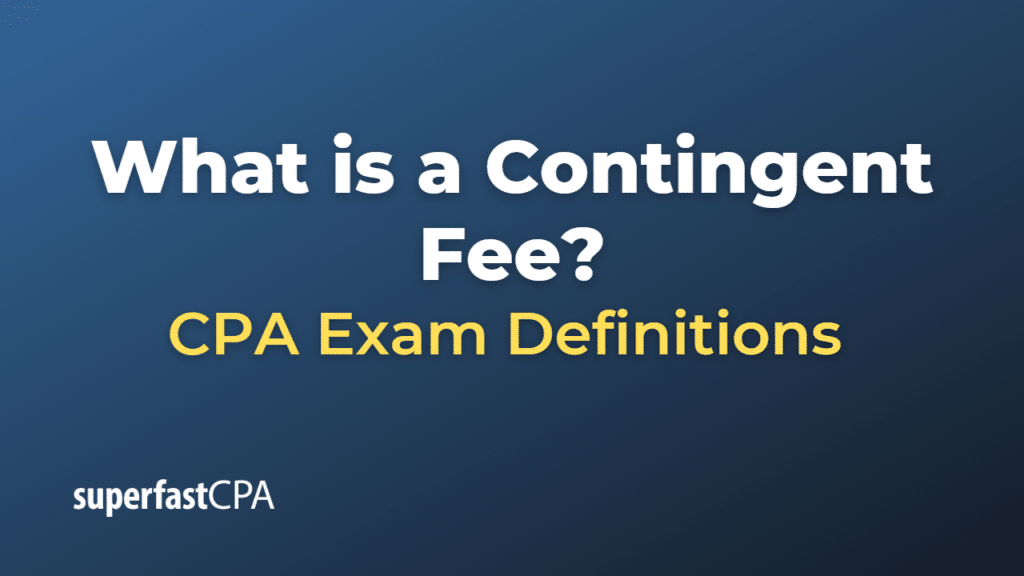Contingent Fee
A contingent fee, also known as a contingency fee, is a payment arrangement between a client and a service provider, typically a lawyer or an attorney, where the service provider’s compensation is dependent on the outcome of the case or transaction. Under this arrangement, the service provider only gets paid if they successfully achieve a favorable result for their client, such as winning a lawsuit or obtaining a settlement. The contingent fee is usually calculated as a percentage of the client’s award or settlement amount.
Contingent fee arrangements are most commonly used in personal injury cases, medical malpractice cases, and other civil litigation where the client is seeking monetary damages. These arrangements can also be used in other legal matters, such as negotiating business contracts, handling real estate transactions, or providing tax advice.
The key benefits of contingent fee arrangements are:
- Access to legal representation: Contingent fees can make it easier for clients who cannot afford to pay upfront legal fees to access legal representation. Clients with limited financial resources can still pursue their legal rights without the burden of paying hourly fees or a retainer.
- Alignment of interests: Contingent fee arrangements align the interests of the client and the service provider, as both parties benefit from a successful outcome. This arrangement incentivizes the service provider to work diligently on the client’s case and strive for the best possible result.
- Risk-sharing: Contingent fee arrangements transfer some of the risk associated with pursuing a legal case from the client to the service provider. If the case is unsuccessful, the service provider does not get paid, which reduces the financial risk for the client.
However, there are also some potential drawbacks to contingent fee arrangements:
- Higher fees in successful cases: In cases where the client wins a large settlement or award, the service provider’s contingent fee may be significantly higher than what they would have earned under an hourly fee arrangement.
- Selectivity of cases: Service providers working on a contingent fee basis may be more selective in the cases they choose to represent, as they bear the risk of not getting paid if the case is unsuccessful.
- Potential conflicts of interest: Contingent fee arrangements can create potential conflicts of interest, as the service provider may be more inclined to accept a quick settlement rather than pursuing a case to trial, even if it may result in a higher award for the client.
Contingent fee arrangements can be beneficial for both clients and service providers in certain situations, but it is essential to carefully consider the potential benefits and drawbacks before entering into such an agreement.
Example of a Contingent Fee
Let’s consider an example of a personal injury case where a contingent fee arrangement is used.
John was injured in a car accident caused by another driver’s negligence. He suffered severe injuries, resulting in substantial medical expenses and lost wages due to his inability to work during his recovery. John decides to hire a personal injury lawyer, Sarah, to help him seek compensation from the negligent driver’s insurance company.
Sarah agrees to represent John on a contingent fee basis. They sign an agreement stating that Sarah’s fee will be 30% of any settlement or award John receives as a result of the case. This arrangement means that John does not have to pay any upfront legal fees, and Sarah will only get paid if she successfully obtains a settlement or award for John.
After several months of negotiation and gathering evidence, Sarah successfully negotiates a settlement of $100,000 for John. As per their contingent fee agreement, Sarah receives 30% of the settlement amount, which is $30,000. John receives the remaining $70,000, which he can use to cover his medical expenses, lost wages, and other damages.
In this example, the contingent fee arrangement enabled John to pursue his personal injury claim without having to worry about paying upfront legal fees. It also aligned Sarah’s interests with John’s, as her compensation was directly tied to the outcome of the case. However, it is worth noting that if the case had been unsuccessful, Sarah would not have received any payment for her work.













